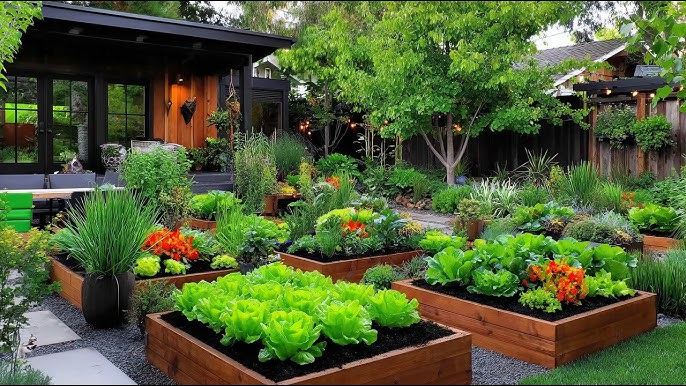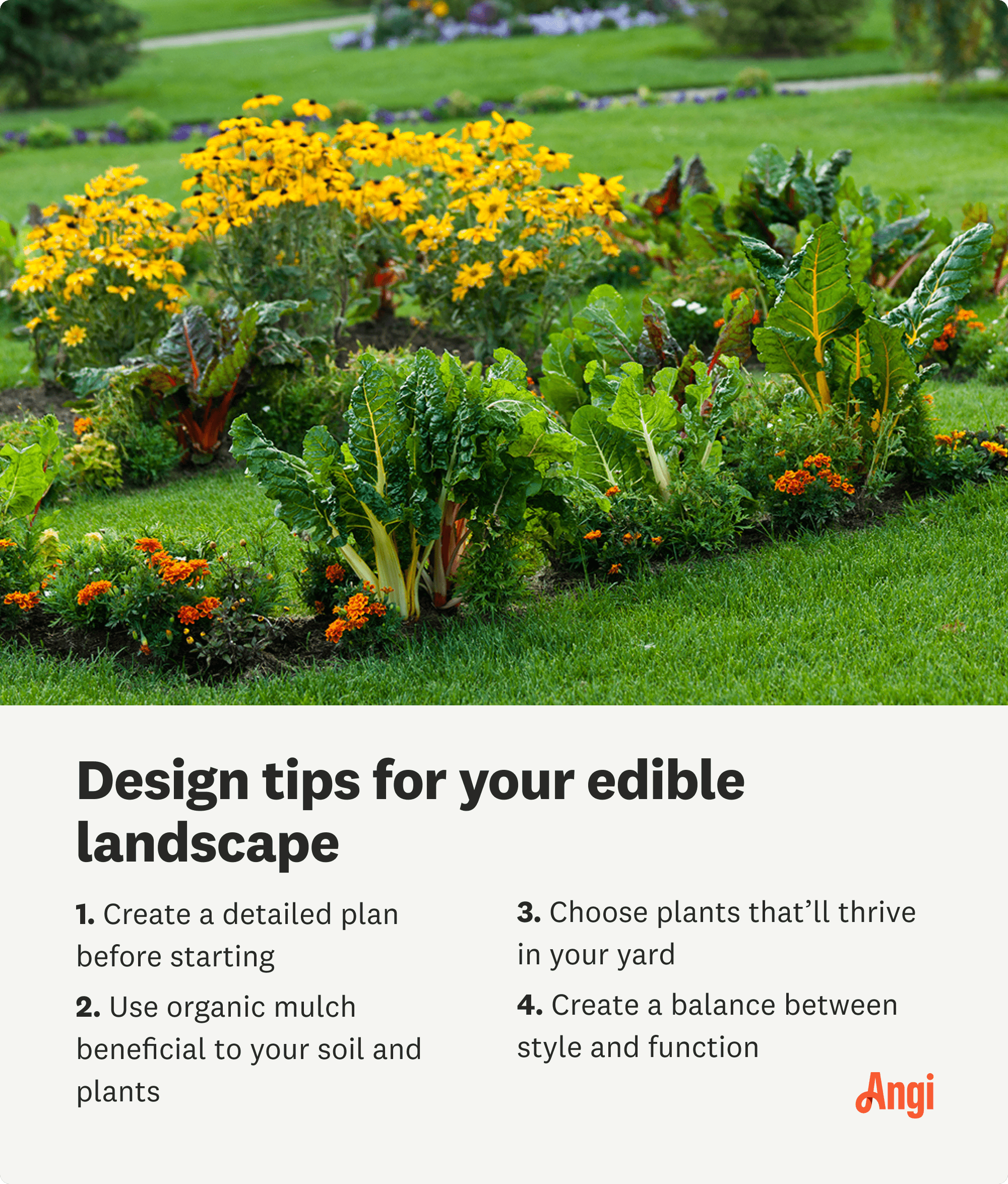Have you ever thought about growing food that looks nice in your garden? Edible landscaping is a way to do this. It means planting food plants that also make your yard beautiful. You can eat from your garden and enjoy a lovely space at the same time.

Credit: www.grocery.coop
What Is Edible Landscaping?
Edible landscaping means using fruits, vegetables, herbs, and nuts as part of your garden design. Instead of just flowers or grass, you add plants that you can eat. This helps you save money and eat fresh food. Plus, it makes your home green and healthy.
Many plants can be both pretty and useful. For example, blueberry bushes have pretty flowers and tasty berries. You can also use herbs like rosemary or thyme. They smell good and add color.

Credit: www.youtube.com
Why Choose Edible Landscaping?
- Fresh food at home: Pick fruits and vegetables when you want.
- Save money: Grow your own food instead of buying it.
- Better for the planet: Less travel for food means less pollution.
- Fun and healthy hobby: Gardening helps you relax and stay active.
- Beautiful garden: Many edible plants look nice and add color.
Easy Edible Plants to Start With
If you are new to edible landscaping, start with easy plants. These grow well and need little care.
| Plant | Why It Is Good | Care Tips |
|---|---|---|
| Strawberries | Sweet fruit and low plants | Grow in sun; water often |
| Basil | Herb with fresh smell and taste | Needs sun; pinch leaves to grow |
| Tomatoes | Bright red fruits; many kinds | Full sun; water regularly |
| Blueberries | Beautiful bushes with berries | Acid soil; sun or part shade |
| Lettuce | Leafy green, grows fast | Cool weather; water well |
Design Ideas for Edible Gardens
Edible landscaping can be simple or fancy. Here are some ideas to help you plan.
1. Mix Edible Plants With Flowers
Plant herbs like chives or mint near flowers. They add color and smell nice. Bees and butterflies will visit your garden more.
2. Use Raised Beds
Raised beds are boxes filled with soil. You can grow vegetables here. They look neat and make gardening easier.
3. Grow Fruit Trees
Fruit trees like apple or pear give shade and food. Place them where they get sun. They also attract birds.
4. Create A Kitchen Garden
Grow herbs, lettuce, and tomatoes near your kitchen door. It is easy to pick fresh ingredients when you cook.
5. Plant Edible Borders
Use low-growing plants like strawberries or herbs as garden edges. This makes a tasty and pretty border.
6. Vertical Gardening
Use trellises or fences for climbing plants like peas or beans. This saves space and looks nice.
Tips for Success
- Know your climate: Choose plants that grow well near you.
- Start small: Try a few plants first to learn.
- Use good soil: Healthy soil helps plants grow strong.
- Water carefully: Don’t give too much or too little water.
- Protect plants: Use nets or fences to keep animals away.
- Harvest often: Pick fruits and herbs when ready to encourage more growth.
Combining Edibles With Garden Styles
You can match edible plants with many garden styles. Here are examples.
Formal Garden
Use boxwood hedges and add herbs like thyme in neat rows. The garden looks tidy and useful.
Cottage Garden
Mix flowers and vegetables freely. Plant beans near roses, and strawberries near daisies.
Modern Garden
Use clean lines and pots. Grow herbs in containers with simple shapes.
Wild Garden
Let plants grow naturally. Add berry bushes and wild herbs for a natural look.
Common Edible Plants for Different Spaces
| Space | Best Edible Plants | Why |
|---|---|---|
| Small Balcony | Herbs, cherry tomatoes, lettuce | Need little space and pots |
| Backyard Garden | Fruit trees, vegetables, berries | More room for bigger plants |
| Front Yard | Edible flowers, herbs, low shrubs | Look pretty and welcome guests |
| Community Garden | Vegetables, beans, corn | Grow large amounts for sharing |
Easy Edible Plants for Beginners
Here are five simple plants to start your edible garden.
- Radishes: Grow fast, good in salads.
- Mint: Smells good, use in drinks.
- Green beans: Grow on poles, easy to harvest.
- Carrots: Sweet and crunchy, need loose soil.
- Sunflowers: Edible seeds and tall flowers.
How to Plan Your Edible Landscape
Start by thinking about your space. How much sun does it get? What plants do you like to eat? Then, make a simple sketch of your garden.
Decide where to put each plant. Taller plants go in the back or center. Smaller ones stay in front or edges. Group plants with similar water needs together.
Think about color and shape too. Mix different leaf shapes and flower colors. This makes the garden fun to look at.
Benefits of Edible Landscaping
- Better taste: Fresh food tastes better than store-bought.
- Healthier eating: You eat more fruits and vegetables.
- Less waste: You only pick what you need.
- Learning opportunity: Kids can learn where food comes from.
- Good for wildlife: Many edible plants attract birds and bees.
In Conclusion
Edible landscaping is a fun and useful way to grow food. It makes your garden beautiful and your meals fresh. You do not need a big space or fancy tools. Just start small and enjoy the process.
Try some of the ideas here. Mix plants, plan well, and watch your garden grow. Soon, you will have a lovely space full of tasty food.
Frequently Asked Questions
What Is Edible Landscaping?
Edible landscaping combines food plants with decorative plants. It creates a beautiful, functional garden space.
How Do I Start Edible Landscaping?
Begin with a plan. Choose plants that thrive in your climate. Mix fruits, vegetables, and herbs.
Which Plants Are Best For Edible Landscaping?
Choose plants like tomatoes, strawberries, and basil. They are both attractive and useful.
Can Edible Landscaping Be Done In Small Spaces?
Yes, use containers and vertical gardens. Maximize space by growing upwards and using pots.
5 min read

